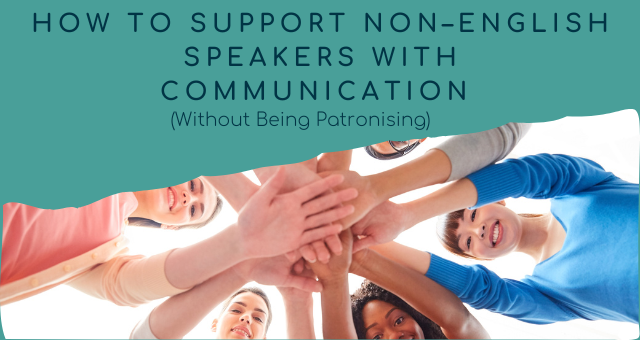
21 Jul How To Support Non–English Speakers With Communication (Without Being Patronising)
Connecting with people from different cultures and who speak different languages is a rich experience. You realise how much you’re stuck in rigid ways of seeing the world and the diversity opens up new ways of seeing the world. And I’m sure you know how powerful shifts in perspectives can be.
But it’s also challenging to connect across language barriers. In this post, I’m sharing 9 tips from my 20+ years experience as both a languages teacher and language learner. I’m qualified in teaching and I have the highest Japanese qualification a foreigner can get in the Japanese Language Proficiency Test. And to be honest, neither of those qualifications comes close in value to cultivating connection and rapport.
The most important thing I’ve learned in my career in languages is that languages exist to connect people and when you use them for that purpose, your communication naturally gets better.
These tips are intended for native English speakers who perhaps don’t have much experience of connecting across languages but who are keen to learn about people who speak other languages.
1. Slow down and speak clearly
Think about when you hear a foreign language – all of the words merge into one long stream and it’s so hard to break it down to understand it. By slowing down and speaking clearly, it’s much easier for a foreign speaker of English to hear the word boundaries and make sense of what you’re saying.
When I first went to Japan to teach English, I was told I was difficult to understand. I didn’t speak clearly because I didn’t articulate clearly – I didn’t move my jaw much to form the sounds. Over the years, I learned to slow down and speak more clearly and it means native speakers can understand me better too. I share this to help you be more aware of how you might be making it harder for English learners to understand you.
2. Keep your sentences simple
When you learn a foreign language, you’ll know the mental gymnastics you have to do to understand complete sentences. “The doctor who was a long-time fan of football, had been working so hard she hadn’t indulged her hobby of watching the games.”
We’ve got “was”, “had been working”, “hadn’t indulged” and “watching” – that’s 4 verbs. That’s 4 major information parts in just 1 sentence. It’s a lot to process and that’s what makes this a really complicated sentence.
We could break it down into: “The doctor was a football fan. She was working so hard that she couldn’t go to games.” There’s still a lot of information in it. It loses some nuances from the original sentence but the basic meaning is the same. The sentence break gives the brain a little more time and space to process the information.
You might lose some nuances, but you’ll keep the connection and get the meaning across and that’s good enough!
3. Avoid idioms
Idioms like “it’s a rip off” or “I’m all ears” are SO hard to understand. If you’ve ever tried learning another language, you’ll know just how hard it is to understand Idioms. Your brain gets stuck on the literal meaning and the idiomatic meaning is rarely obvious.
Instead, put what you want to say into literal language. For the idioms I mentioned before, “it’s expensive” or “I’m listening” are so much easier to understand.
4. Give them time and space to answer – be patient
As a foreign language speaker, your brain is really busy. There’s an awful lot of cognitive processing to do to understand a foreign language. You have to hear the sounds, map those sounds onto words that you may or may not have mastered. Then you have to figure out the whole sentence meaning and then you have to formulate a response. It’s a LOT!
So please be patient and supportive while they process what you’ve said and reply to you.
5. Remember it’s courageous to speak a foreign language and risk mistakes.
Very few native English speakers need to or want to learn foreign languages. For better or worse, English gets you very far in this world. Speaking a foreign language is courageous. You’re risking the embarrassment of mistakes and failure to connect, which can leave you feeling ashamed, frustrated and even rejected. It’s a lot!
So please bear that in mind and make it safe to make mistakes. Even if understanding doesn’t happen, try to make sure that connection happens beyond the language.
6. Don’t correct their English if you understood – unless they ask you to
Related to number 5 is the idea that if you understood what they said, don’t correct mistakes. Focus on connection and comprehension. Unless they specifically ask you to correct them, if you’ve understood, communication has succeeded. There’s no need to be perfect in conversations.
7. Use non-verbal communication to support what you’re saying
Pictures, gestures, writing words down – these can all support the brain to understand. There’s more information beyond that stream of sound to grasp the meaning.
Plus the extra effort in trying to get the message across shows that you care and it supports that vital connection that makes it safe to make mistakes.
8. Learn some of their language too
Learning something in their language shows that you’re interested. And it also helps you see from their perspective (it puts you in their shoes to use an idiom!) You soon realise what a challenge language learning is, but also what a joy it is when you remember the words and use them to connect.
9. Use google translate to ease the understanding of difficult words
Google translate isn’t perfect, and you don’t want to rely on it. But it’s a helpful aid to support conversations. When I was first learning Japanese and beginning to connect with like-minded Japanese people, we didn’t have smartphones so I took my dictionary with me everywhere I went. That moment of finding the right word and connecting the meaning is such a joy. You’ve transcended the language barrier and come closer to someone from a totally different culture.
If google translate or any other dictionary/translation app can help you do that – then go for it!
Why This Blog On A Healer And Writer’s Website?
Well, despite quitting my teaching contract in 2014 after 14 years of teaching languages., I’ve never actually stopped. I’ve taught Japanese alongside seeing hypnotherapy clients. And right around the time the name for the collaborative book “The Alchemy of Connection” popped into my mind, life took me back to my language teacher roots on English language teaching projects for refugees.
It’s been a healing experience to be back in the classroom properly and it’s helped me realise the wealth of insights on connection that language teaching has brought me. I just love bringing together diverse people and holding space for them to connect. And that’s what I can share with the authors who co-create the book and community with me.
I just know that “The Alchemy of Connection” is going to be a magical, transformational experience for everyone that’s involved.
If you’d like to know more about the book and project and sample the connection activities we’ll be doing throughout this 12 month project, then click the button below to sign up and enjoy the workshop:



